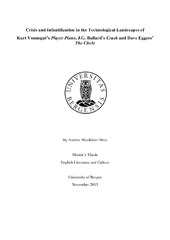Crisis and Infantilization in the Technological Landscapes of Kurt Vonnegut's Player Piano (1952), J.G. Ballard's Crash (1973) and Dave Eggers' The Circle (2013)
Master thesis
Permanent lenke
https://hdl.handle.net/1956/10770Utgivelsesdato
2015-11-27Metadata
Vis full innførselSamlinger
Sammendrag
Literature has a long history of articulating the dangers as well as the possibilities for human life in confrontation with technology. Among the literatures expressing these concerns we also find Player Piano (1952) by Kurt Vonnegut, Crash (1973) by J.G. Ballard and The Circle (2013) by Dave Eggers. This thesis aims at providing an understanding of the literary interpretation of the human condition in the technological landscape seen in Player Piano, Crash and The Circle, more specifically, how the novels imagine conjunctions of human and machine and the effect of this confrontation on the psychological development of the characters. The analysis is based on an exploration of textual juxtapositions of technological progress and psychological stagnation, a tension that functions as a vehicle for the novel's ideological criticism. A reading of the characters' development through psychoanalytic theory reveals two recurring themes: crisis and infantilization. I litteraturen blir ofte teknologi fortolket som en trussel som går på bekostning av grunnleggende menneskelige behov. Player Piano (1952) av Kurt Vonnegut, Crash (1973) av J.G. Ballard og The Circle (2013) av Dave Eggers, er tre romaner som artikulerer en slik kritikk av teknologiens inngripen i individets liv. Denne masteroppgaven utforsker de teknologiske landskapene som blir skildret i de tre romanene, med det overordnede målet å formulere en forståelse av hvordan tekstene tematiserer en kritikk av teknologi. Analysen utforsker hvordan romanene beskriver den teknologiske kroppen, og de psykologiske effektene av en kroppslig tilstand i endring i møte med teknologi. Min argumentasjon er basert på en analyse av de tre tekstenes beskrivelser av teknologiske framskritt, som hele tiden sammenstilles med psykologisk stagnasjon: krise og infantilisering. En nærlesning av romanenes hovedkarakterer basert på psykoanalytisk teori viser hvordan spenningen mellom disse tekstuelle elementene fungerer som ideologikritikk, som dermed får betydning for romanenes politiske argumentasjon.
